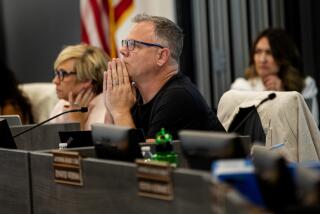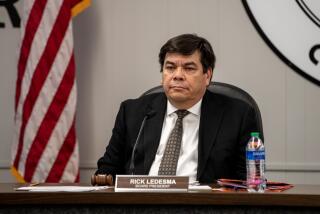Frogue Is Past Recall Effort but Not Controversy
- Share via
Amid a burgeoning controversy over college Trustee Steven J. Frogue earlier this year, one of his ardent supporters stood during a meeting recess and loudly voiced a prediction even more chilling than the frosty air outside.
“We’re headed for a bloody race war in this country,” said the supporter, a friend of people with ties to white supremacists, “and I can’t wait.”
It was just one more disturbing moment spun out of the stormy career of Frogue, a trustee and past board president of the South Orange County Community College District.
In six years, Frogue has earned the enmity of many professors, students, gays, Jews, Democrats and Republicans who came together in one of the most remarkable political coalitions in Orange County history this year to oust him via a recall campaign.
So when that effort was pronounced a failure by Orange County election officials earlier this month, Frogue’s many enemies were dumbfounded. How could a campaign with bipartisan support, paid signature-gatherers, decent funding, endorsement from Christians and Jews and leadership from educators fail?
They were particularly baffled because the failure came after a series of Frogue-inspired spectacles over the last few years: shouting matches between Jews and white supremacists, anti-gay fliers warning of “same-sex marriages,” Frogue’s peculiar condemnations of the Anti-Defamation League, his repeated denouncement of faculty organizations, his tiebreaking vote in favor of his own seminar featuring Kennedy assassination theorists considered anti-Semitic.
Meanwhile, Frogue declared victory, saying voters had vindicated him and ‘repudiated’ the recallers.
“It’s what happens with lots of recalls,” said Lisa Alvarez, a recall proponent and associate professor of English at Irvine Valley College. “They seldom succeed, not because they aren’t meritorious, but because it is so difficult to do.
“It’s like impeachment--you’re not supposed to be able to do it whimsically or arbitrarily.”
Frogue has denied many times that he is anti-Semitic. But his animosity toward the Anti-Defamation League, which documents and reports on intolerance and hate movements, and his reluctance to denounce extremists who support him have fueled speculation about his real beliefs and carried the recall campaign further than most in Orange County ever go. Frogue could not be reached for comment.
In Orange County, there have been 36 attempts at county-level recalls since 1991, including the Frogue attempt. Every one failed.
“People are very, very motivated at the beginning, but it gets very hard to keep doing it,” said Suzanne Slupsky, elections supervisor for the Orange County registrar’s office. “They get to the point of filing the notice of intent, but they never bring in the actual signatures.”
Slupsky said the Frogue recall campaign was the first since 1991 to actually file signatures. None of the other 35 even got that far. She did not have figures available for City Council recalls, which are administered by officials in individual cities.
Part of the failure of the Frogue recall was due to the number of signatures required to place a recall question on the ballot. Initiatives are much easier to put on the ballot than recalls because they require far fewer signatures.
Statewide initiatives must have petitions with 5% of the total number of votes cast in the last election for governor for changes in statutes and 8% of that number for constitutional amendments.
For county-level initiatives, state law requires 10% of the number of votes cast for governor in that county.
However, for a recall such as the Frogue campaign, laws set a more challenging standard. In an area with more than 100,000 registered voters, recall proponents must collect 10% of the signatures of those registered.
Because the number of those casting ballots is usually far lower--50% to 60% of those registered--achieving the higher signature requirement is all the more difficult.
With about 380,000 voters registered in the South Orange County Community College District, state law required recallers to collect about 38,000 valid signatures, 10% of the total number registered.
If the recall law was patterned after the initiative provisions of the state Constitution, the recallers would only have had to obtain 5% of the number of votes cast in the last college trustees election. There were about 190,000 votes cast in that election. Five percent of the number of votes cast would be about 9,500, a mark the Frogue recallers could have hit easily.
“In our campaign, altogether, 65,000 voters took the time to stop and sign our petitions,” said Brenda Borron, an Irvine Valley College professor of English and recall supporter. “These people will remember Mr. Frogue when he comes up for reelection in 2000.”
Campaign director Margaret Thomas said the effort, the second recall drive against Frogue, was hampered by uneven flows of money, even though the second effort collected more than $100,000 and spent more than $120,000. Not enough money came in early in the campaign, leading to a desperate push at the end.
Thomas hired people to gather signatures, paying them 75 cents per signature at first, then upping the rate to $1. She said most statewide initiatives with heavy funding typically pay $2 a signature. Frogue recallers also were paid a bonus for batches of 500 signatures.
Late in the campaign, Thomas hired a Sacramento firm to help gather signatures, netting an additional 12,000 in the final days. On Oct. 11, when petitions were due, Thomas stood outside the registrar’s office at 4:55 p.m., five minutes before the final deadline, waiting for 700 more signatures.
Campaign Falls Short, but Controversy Stays
But it was not enough. In all, petitions bearing more than 51,000 signatures were turned in. More than 3,000 of those were duplicate signatures and were ruled invalid. Another 13,000 either were not registered in Orange County or had addresses that did not match their voter registration records, another grounds for being thrown out.
Just 32,322 of the signatures were considered valid, leaving Frogue to claim victory without having spent any money in his political defense.
The uphill campaign had its detractors. Some volunteers drifted away after concluding the recall was an inefficient way to address the college system’s problems.
“They should have spent the money promoting other candidates,” said one volunteer, who asked to remain anonymous. “Recalls never go anywhere.”
Orange County Democratic Chairwoman Jeanne Costales blamed a portion of the failure on local political attitudes, which she said are strongly influenced by the religious right.
“The religious right has more influence in these types of things, but a recall is terribly hard because it’s such a huge area and you need so many signatures.”
But recall proponents said they could not have attracted public support to a community college campaign, usually a politically subdued election, without the spectacle of Frogue. First elected in 1992, Frogue began making enemies by crusading against faculty governance groups in 1994; targeting a Holocaust course in 1995; intermittently railing against the Anti-Defamation League; and, finally, by proposing to teach a seminar on the Kennedy assassination in 1997 featuring two writers for a weekly newspaper considered anti-Semitic.
This year, Frogue’s supporters, including members of groups that espouse white supremacist and anti-immigrant beliefs, turned college board meetings into an unsettling forum for speeches about Frogue, the Anti-Defamation League and the Holocaust, prompting protests and forcing trustees to restrict public comment opportunities. Campus police maintained a heavy presence during those gatherings.
Last month, a strongly anti-Jewish e-mail was sent to every Irvine Valley College e-mail address, including professors and administrators. Frogue was apparently not involved, although he is widely blamed for helping create the atmosphere giving rise to the episode.
“I resent him [Frogue] so much and hold him responsible for bringing this hatred to our campus,” Borron said. “Everybody at IVC would not have gotten a piece of hate mail about Jews if it hadn’t been for Steven Frogue.”
Frogue supporters such as John S. Williams, the current board president, believe the recall effort’s failure was due to the hard support Frogue enjoys in the conservative college district. Williams noted that Frogue was reelected in 1996 with about 115,000 votes out of 190,000 cast. As the district tries to work in a new chancellor and overcome long-standing problems, Williams hopes the recall campaign’s failure means that college officials are free from the worry of funding the election, which could have cost up to $700,000.
“I’m glad this is over,” Williams said. “I’m glad we don’t have to look over our shoulder any longer. It’s time to move on.”
But the college district, which serves 33,000 students, remains beset by problems, both internally and externally, some related to Frogue’s legacy.
As recently as Nov. 20, Williams was in court to help defend the college district against a lawsuit brought by college professors who said the trustees repeatedly violated the state open meetings act in moving too hastily last year to appoint a new Irvine Valley College president, reorganize the district and institute other changes.
The district already is appealing a ruling by Orange County Superior Court Judge Tully H. Seymour from an earlier case in which he said trustees violated the open meetings law, known as the Brown Act.
The college faces two other key tests: It is under financial scrutiny by state college officials for inadequate budget reserves, a problem that may be dissipating, and it has been harshly criticized by teams conducting its crucial review for accreditation renewal.
All the while, the district’s two campuses, Irvine Valley College and Saddleback College in Mission Viejo, are being run by new administrators and are plagued by dissension between administrators and professors.
And while Frogue has appealed to foes in the wake of the recall’s failure to focus on ways to “ennoble our colleges,” the coalition that formed against him continues to view him with suspicion, seeing him as a far-right menace that must be contained.
“We need to be as organized as the other side--the religious right, the right-wing Republicans,” said Harriet Walther, a former trustee and recall proponent. “We need to make sure the mainline Protestant churches, the Catholics and the Jews see what’s happening here is a threat to democratic institutions.”
More to Read
Sign up for Essential California
The most important California stories and recommendations in your inbox every morning.
You may occasionally receive promotional content from the Los Angeles Times.













